Abstract
OBJECTIVES: Despite greater negative environmental influences such as lower socioeconomic status, less parental education, more single-parent households and urban dwelling, African Americans are less likely to begin smoking than European Americans. The goal of the current investigation was to examine the proportion of genetic and environmental influences on smoking in a sample of adult African-American twins. DESIGN: Birth records from North Carolina Register of Deeds Offices were used to identify participants for the Carolina African-American Twin Study of Aging (CAATSA). Participants completed an in-person interview that included measures of health status, cognition and psychosocial measures. PARTICIPANTS: Data for the analysis come from 200 pairs of same-sex twins (97 identical pairs and 113 fraternal), with a mean age = 46.9 years (SD = 13.9) and 38% of the sample being men. RESULTS: Compared to previous research on smoking, our estimates are very similar with genetics, accounting for about 60% of the individual variance in current smoking. We did find that there was a significant amount of genetic variance in pack years but no shared environmental influences. CONCLUSION: Similarity in proportions of genetic influences lead to larger questions about the genes involved in smoking among African Americans working in the same manner as in Caucasians or other groups. Additionally, this same question holds for the environmental variance. It is perhaps most likely that while the proportions of environmental variance are similar between groups that the actual source of variance (e.g., poverty, urban rural context, socioeconomic status, attitudes of family and friends) may differ when comparing ethnic groups.
Full text
PDF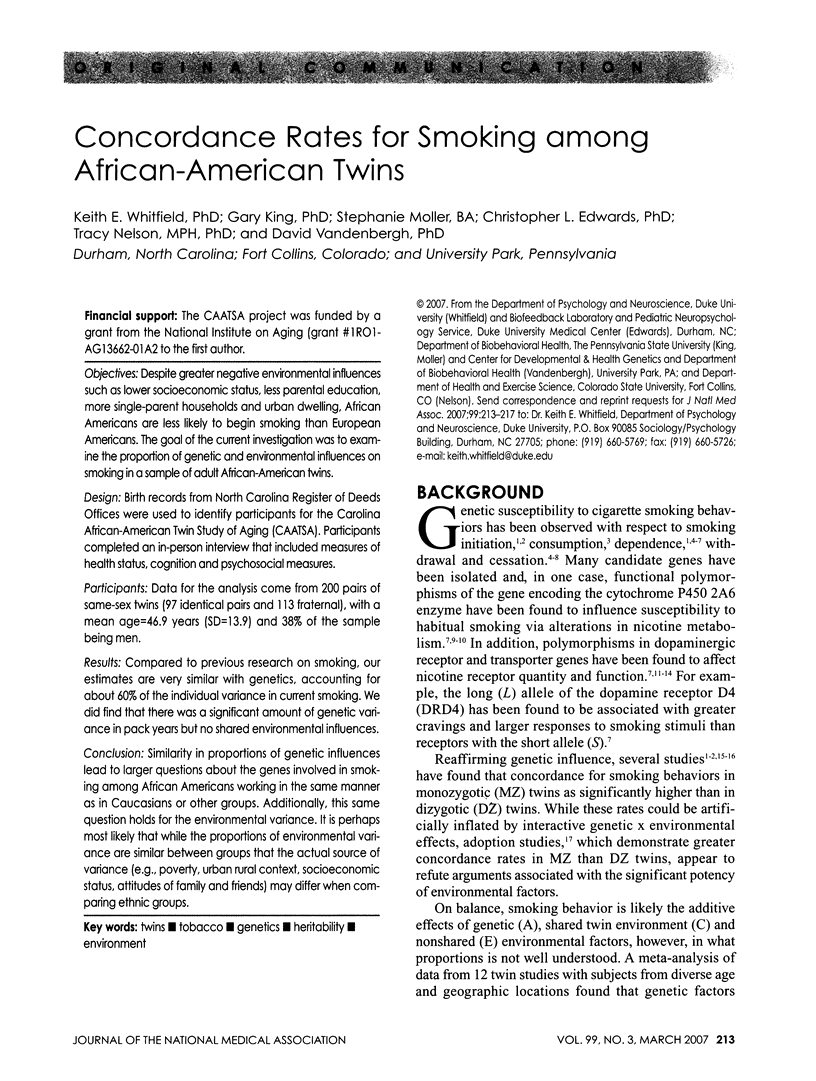
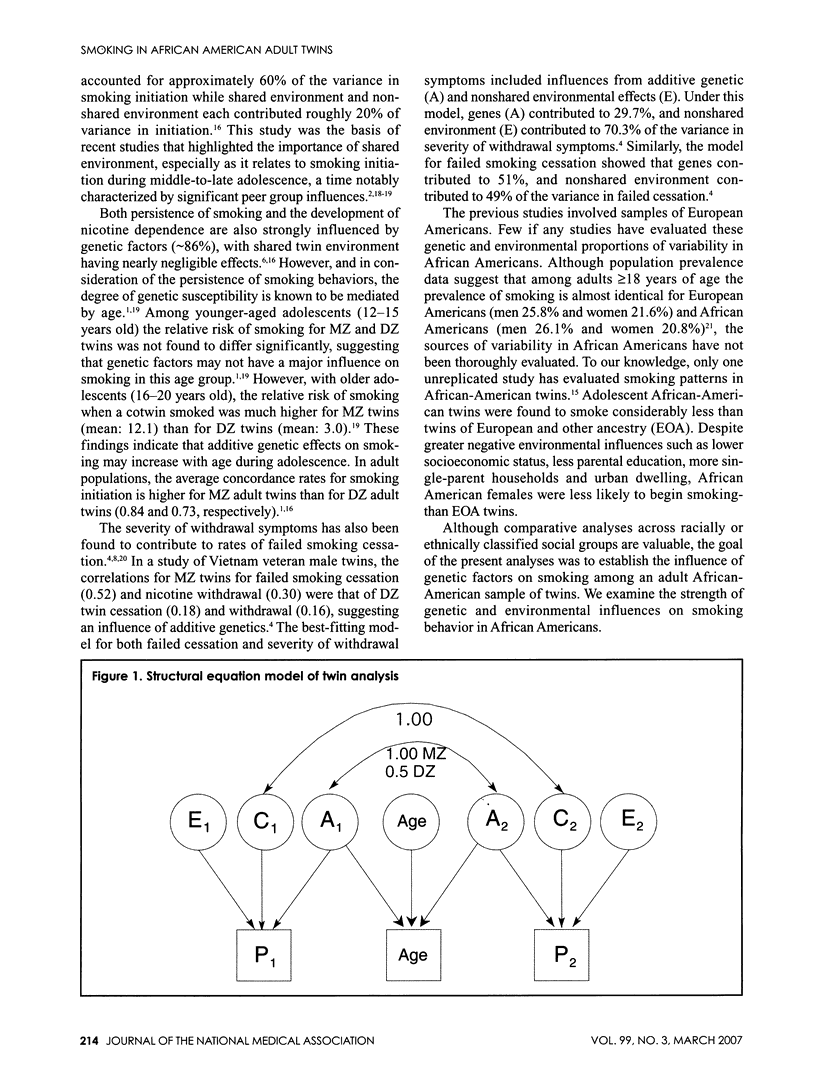
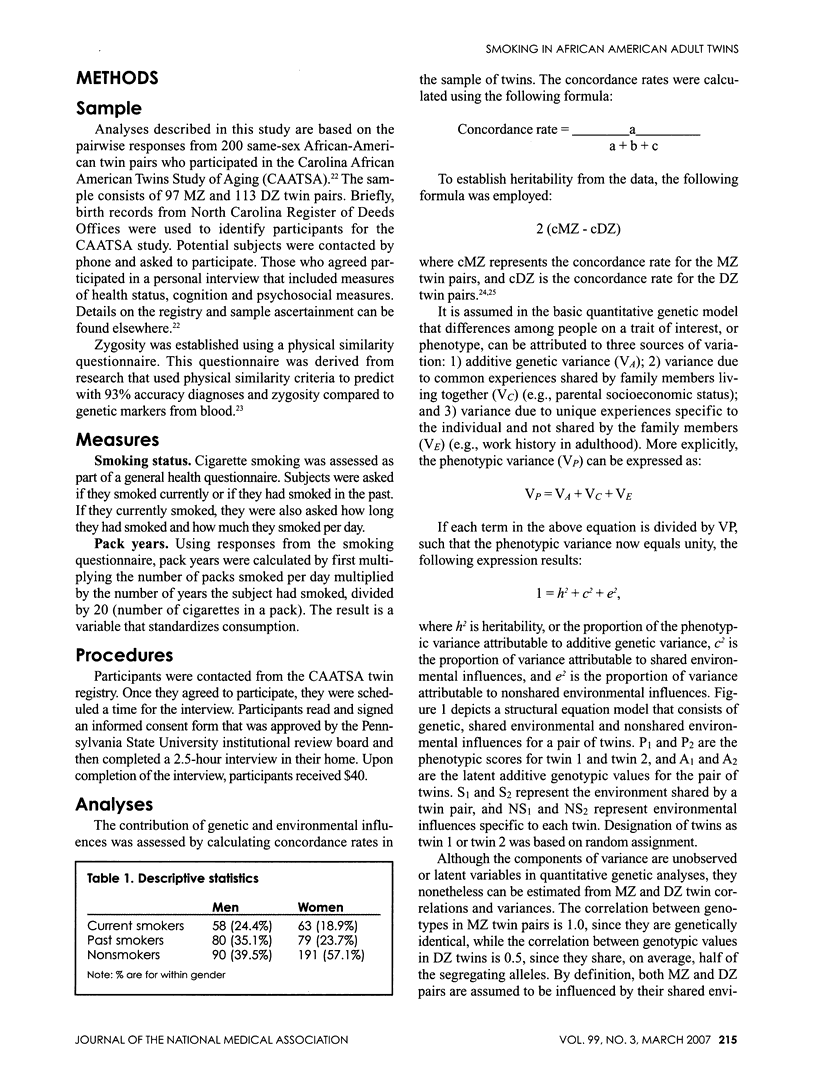
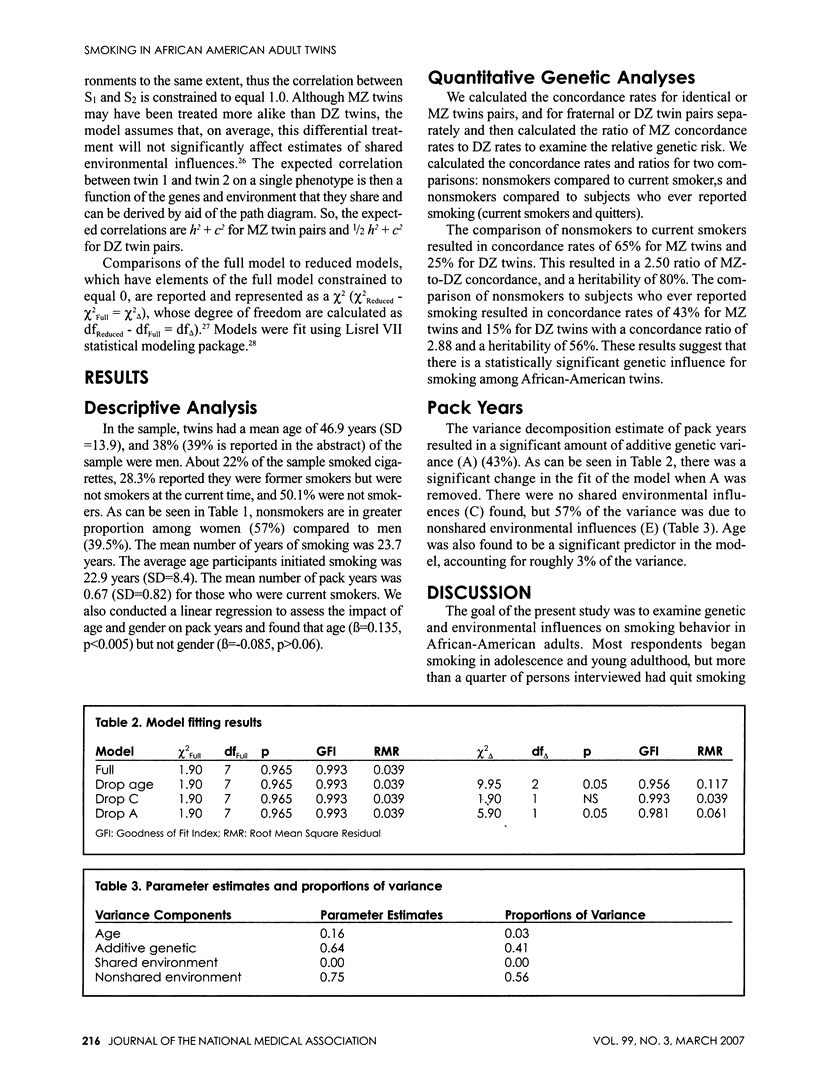
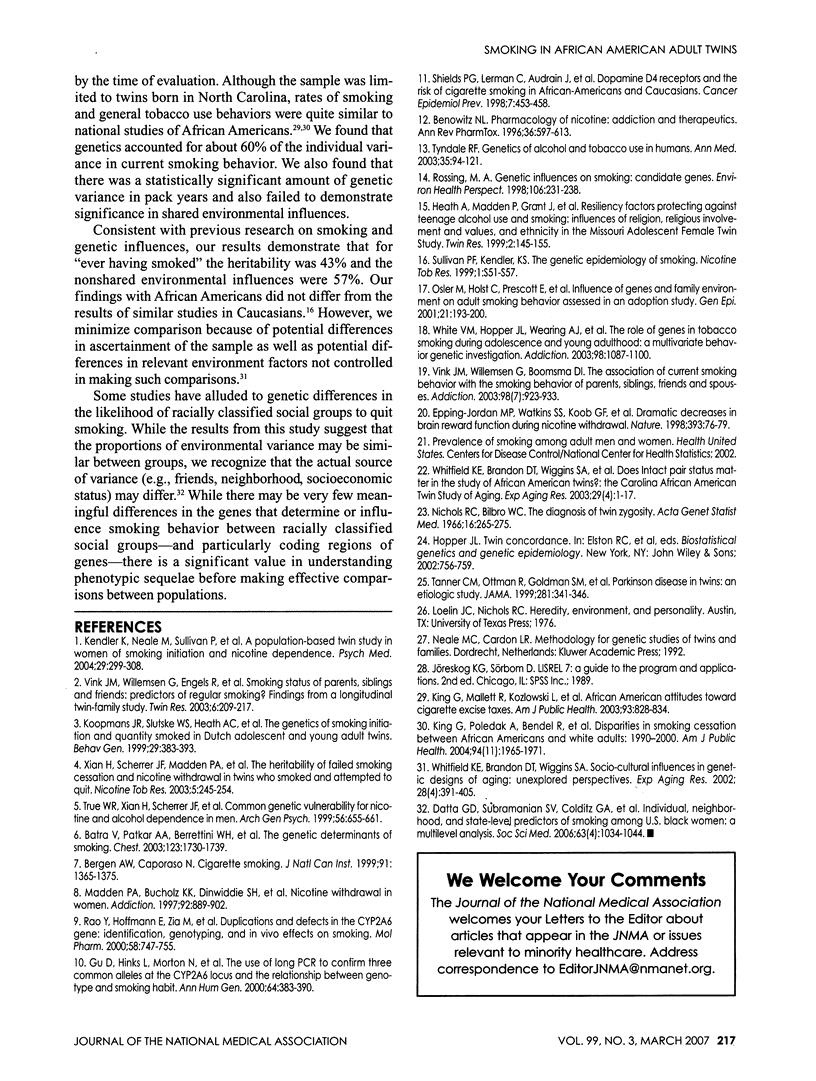
Selected References
These references are in PubMed. This may not be the complete list of references from this article.
- Batra Vikas, Patkar Ashwin A., Berrettini Wade H., Weinstein Stephen P., Leone Frank T. The genetic determinants of smoking. Chest. 2003 May;123(5):1730–1739. doi: 10.1378/chest.123.5.1730. [DOI] [PubMed] [Google Scholar]
- Benowitz N. L. Pharmacology of nicotine: addiction and therapeutics. Annu Rev Pharmacol Toxicol. 1996;36:597–613. doi: 10.1146/annurev.pa.36.040196.003121. [DOI] [PubMed] [Google Scholar]
- Bergen A. W., Caporaso N. Cigarette smoking. J Natl Cancer Inst. 1999 Aug 18;91(16):1365–1375. doi: 10.1093/jnci/91.16.1365. [DOI] [PubMed] [Google Scholar]
- Datta Geetanjali Dabral, Subramanian S. V., Colditz Graham A., Kawachi Ichiro, Palmer Julie R., Rosenberg Lynn. Individual, neighborhood, and state-level predictors of smoking among US Black women: a multilevel analysis. Soc Sci Med. 2006 May 2;63(4):1034–1044. doi: 10.1016/j.socscimed.2006.03.010. [DOI] [PubMed] [Google Scholar]
- Epping-Jordan M. P., Watkins S. S., Koob G. F., Markou A. Dramatic decreases in brain reward function during nicotine withdrawal. Nature. 1998 May 7;393(6680):76–79. doi: 10.1038/30001. [DOI] [PubMed] [Google Scholar]
- Gu D. F., Hinks L. J., Morton N. E., Day I. N. The use of long PCR to confirm three common alleles at the CYP2A6 locus and the relationship between genotype and smoking habit. Ann Hum Genet. 2000 Sep;64(Pt 5):383–390. doi: 10.1046/j.1469-1809.2000.6450383.x. [DOI] [PubMed] [Google Scholar]
- Heath A. C., Madden P. A., Grant J. D., McLaughlin T. L., Todorov A. A., Bucholz K. K. Resiliency factors protecting against teenage alcohol use and smoking: influences of religion, religious involvement and values, and ethnicity in the Missouri Adolescent Female Twin Study. Twin Res. 1999 Jun;2(2):145–155. doi: 10.1375/136905299320566013. [DOI] [PubMed] [Google Scholar]
- Kendler K. S., Neale M. C., Sullivan P., Corey L. A., Gardner C. O., Prescott C. A. A population-based twin study in women of smoking initiation and nicotine dependence. Psychol Med. 1999 Mar;29(2):299–308. doi: 10.1017/s0033291798008022. [DOI] [PubMed] [Google Scholar]
- King Gary, Mallett Robyn K., Kozlowski Lynn T., Bendel Robert B. African Americans' attitudes toward cigarette excise taxes. Am J Public Health. 2003 May;93(5):828–834. doi: 10.2105/ajph.93.5.828. [DOI] [PMC free article] [PubMed] [Google Scholar]
- King Gary, Polednak Anthony, Bendel Robert B., Vilsaint My C., Nahata Sunny B. Disparities in smoking cessation between African Americans and Whites: 1990-2000. Am J Public Health. 2004 Nov;94(11):1965–1971. doi: 10.2105/ajph.94.11.1965. [DOI] [PMC free article] [PubMed] [Google Scholar]
- Koopmans J. R., Slutske W. S., Heath A. C., Neale M. C., Boomsma D. I. The genetics of smoking initiation and quantity smoked in Dutch adolescent and young adult twins. Behav Genet. 1999 Nov;29(6):383–393. doi: 10.1023/a:1021618719735. [DOI] [PubMed] [Google Scholar]
- Madden P. A., Bucholz K. K., Dinwiddie S. H., Slutske W. S., Bierut L. J., Statham D. J., Dunne M. P., Martin N. G., Heath A. C. Nicotine withdrawal in women. Addiction. 1997 Jul;92(7):889–902. [PubMed] [Google Scholar]
- Nichols R. C., Bilbro W. C., Jr The diagnosis of twin zygosity. Acta Genet Stat Med. 1966;16(3):265–275. doi: 10.1159/000151973. [DOI] [PubMed] [Google Scholar]
- Osler M., Holst C., Prescott E., Sørensen T. I. Influence of genes and family environment on adult smoking behavior assessed in an adoption study. Genet Epidemiol. 2001 Nov;21(3):193–200. doi: 10.1002/gepi.1028. [DOI] [PubMed] [Google Scholar]
- Rao Y., Hoffmann E., Zia M., Bodin L., Zeman M., Sellers E. M., Tyndale R. F. Duplications and defects in the CYP2A6 gene: identification, genotyping, and in vivo effects on smoking. Mol Pharmacol. 2000 Oct;58(4):747–755. doi: 10.1124/mol.58.4.747. [DOI] [PubMed] [Google Scholar]
- Rossing M. A. Genetic influences on smoking: candidate genes. Environ Health Perspect. 1998 May;106(5):231–238. doi: 10.1289/ehp.98106231. [DOI] [PMC free article] [PubMed] [Google Scholar]
- Shields P. G., Lerman C., Audrain J., Bowman E. D., Main D., Boyd N. R., Caporaso N. E. Dopamine D4 receptors and the risk of cigarette smoking in African-Americans and Caucasians. Cancer Epidemiol Biomarkers Prev. 1998 Jun;7(6):453–458. [PubMed] [Google Scholar]
- Sullivan P. F., Kendler K. S. The genetic epidemiology of smoking. Nicotine Tob Res. 1999;1 (Suppl 2):S51–S70. doi: 10.1080/14622299050011811. [DOI] [PubMed] [Google Scholar]
- Tanner C. M., Ottman R., Goldman S. M., Ellenberg J., Chan P., Mayeux R., Langston J. W. Parkinson disease in twins: an etiologic study. JAMA. 1999 Jan 27;281(4):341–346. doi: 10.1001/jama.281.4.341. [DOI] [PubMed] [Google Scholar]
- True W. R., Xian H., Scherrer J. F., Madden P. A., Bucholz K. K., Heath A. C., Eisen S. A., Lyons M. J., Goldberg J., Tsuang M. Common genetic vulnerability for nicotine and alcohol dependence in men. Arch Gen Psychiatry. 1999 Jul;56(7):655–661. doi: 10.1001/archpsyc.56.7.655. [DOI] [PubMed] [Google Scholar]
- Tyndale Rachel F. Genetics of alcohol and tobacco use in humans. Ann Med. 2003;35(2):94–121. doi: 10.1080/07853890310010014. [DOI] [PubMed] [Google Scholar]
- Vink Jacqueline M., Willemsen Gonneke, Boomsma Dorret I. The association of current smoking behavior with the smoking behavior of parents, siblings, friends and spouses. Addiction. 2003 Jul;98(7):923–931. doi: 10.1046/j.1360-0443.2003.00405.x. [DOI] [PubMed] [Google Scholar]
- Vink Jacqueline M., Willemsen Gonneke, Engels Rutger C. M. E., Boomsma Dorret I. Smoking status of parents, siblings and friends: predictors of regular smoking? Findings from a longitudinal twin-family study. Twin Res. 2003 Jun;6(3):209–217. doi: 10.1375/136905203765693861. [DOI] [PubMed] [Google Scholar]
- White Victoria M., Hopper John L., Wearing Alexander J., Hill David J. The role of genes in tobacco smoking during adolescence and young adulthood: a multivariate behaviour genetic investigation. Addiction. 2003 Aug;98(8):1087–1100. doi: 10.1046/j.1360-0443.2003.00427.x. [DOI] [PubMed] [Google Scholar]
- Whitfield Keith E., Brandon Dwayne T., Wiggins Sebrina A. Sociocultural influences in genetic designs of aging: unexplored perspectives. Exp Aging Res. 2002 Oct-Dec;28(4):391–405. doi: 10.1080/03610730290080407. [DOI] [PubMed] [Google Scholar]
- Whitfield Keith E., Wiggins Sebrina. The influence of social support and health on everyday problem solving in adult African Americans. Exp Aging Res. 2003 Jan-Mar;29(1):1–13. doi: 10.1080/03610730303703. [DOI] [PubMed] [Google Scholar]
- Xian Hong, Scherrer Jeffrey F., Madden Pamela A. F., Lyons Michael J., Tsuang Ming, True William R., Eisen Seth A. The heritability of failed smoking cessation and nicotine withdrawal in twins who smoked and attempted to quit. Nicotine Tob Res. 2003 Apr;5(2):245–254. [PubMed] [Google Scholar]


